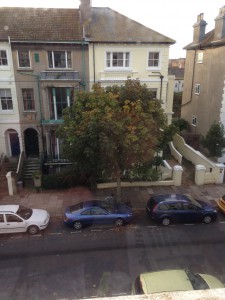My favourite tree
MY FAVOURITE TREE
 My favourite tree in front of my house in Hove, a still small but sturdy chestnut has lost now but all of its leaves. They already turned golden brown and although the last ones are holding on to the branches with all their might, they also soon will be scattered by the winds that have changed and now blow with a ‘Cutting sound’ as the wind blows in autumn as the Nei Jing (The book of the Yellow Emperor, the classic discourse on Acupuncture) states.
My favourite tree in front of my house in Hove, a still small but sturdy chestnut has lost now but all of its leaves. They already turned golden brown and although the last ones are holding on to the branches with all their might, they also soon will be scattered by the winds that have changed and now blow with a ‘Cutting sound’ as the wind blows in autumn as the Nei Jing (The book of the Yellow Emperor, the classic discourse on Acupuncture) states.
Summer gave way already 6 weeks ago to autumn here in Sussex and one can see it in the changing of the light. Not only that, the seagulls who normally wake us up in the morning at the utter delight of Micaela, are returning to our rooftops, from their passage at the cliffs, hovering over the sea. Although the images of spring impress with their freshness and strength of new life, the colour of autumn trees show the grandeur of the British country side in all it’s elegance.
It’s autumn when all things in nature reach their peak in full maturity, the grains have ripened, the grapes are bursting with their sweet must and the harvest is made. The development of a whole year has reached it’s peak and the expanding energies are making a U-turn, contraction and concentration taking form. ‘Yang has changed into Yin’, the ‘active’ phase has given place to the ‘passive’. The growing has changed to the gathering.
It’s time to leave the lighthearted outgoing life of walks on the beach, sitting at the terraces and night parties to a more weather protected outgoing and indoor life.
Many people find this period of the year one of the emotionally most difficult, the image of the falling leaves is an oh so pungent image of ‘letting go’ and imminent death. The harsh weather induces harsh emotional states. More people slip into depressed moods in autumn than in any other season.
Ancient knowledge states that autumn should be lived with a calm and peaceful state of mind, with restrain from excess sadness, the most common emotion in autumn, to prepare the smooth transition to winter.It’s time to gather one’s spirit and energy, to be more focused (than in the ‘light’ summertime), and be more centred to not let the senses ‘run free’.
The organ that is at the centre of our attention should be the lungs, inducing us to practise breathing exercises more than in any other season. The lungs are at its most vulnerable point in the whole year
.Eddard Stark, the Lord of Winterfell warns us all that; ‘Winter is coming’, probably he realises that after 9 years of summer maybe 9 years of winter might be at our doorsteps. Maybe he knows as Lord of the North what it means, he and his people will be the first to suffer from it. He seems to resemble ancient knowledge, he has lived long winters.
 Warning his brother Benjen is hardly necessary, as a renowned raider of the Night Watch he is prepared to protect his people from the white walkers (The uncontrollable power of the north energy), one has to prepare oneself in advance, before the cold strikes.
Warning his brother Benjen is hardly necessary, as a renowned raider of the Night Watch he is prepared to protect his people from the white walkers (The uncontrollable power of the north energy), one has to prepare oneself in advance, before the cold strikes.
Ancient knowledge also tells us that in the season we are in we have to prepare for the illnesses of the next one.
At the same time, executing the ‘deserter’ from the night watch he wants to show his youngest son Bran that one has to take total responsibility for one’s actions and judgements and act according to that. The ‘easy’ times of summer have gone and we’re preparing ourselves for winter. One has to make the passage to growing up.
This is much more than a metaphorical act.
The gathering aspect of autumn should lead to reflection of what we have done the last year, the gathering of our harvest, to reflection of where we want to go, and preparing us to gathering the necessary energy to burst out in the next spring.
Our disconnection from the changing of the seasons is disconnecting us from ‘easy’ power available ‘if we just would listen’……just looking at the first light of the sun, just watching the changing of the tides would help us to connect to the changing powers of nature even in the heart of Manhattan, and help us to adjust to the bigger powers that rule us.
The tendency to give in to melancholia and excessive sadness in autumn has to be controlled, the best way to counteract that is to go out walking, preferably in nature: forest, beach, mountains, but even in the city. Excessive grief will damage the lungs and will harm the kidney (winter) energy, not only can it lead to diarrhoea (the large intestine is the ‘active’, yang, part of the lungs) but it can also inhibit the kidneys (winter organ) to help digest properly and damage their ‘storing’ qualities. It’s in winter when all things in nature wither and return ‘home’.
Autumn is a time when we turn to our friends and family and people we might don’t even know, in struggling despair, to inspire and give solace and to convince them that after ‘Winter has come’ there will always be another Spring, even if we have to wait 9 years for it.
Autumn for me is a period to sit at home after a long walk, sip tea, listen to Schubert’s ‘Lieder ohne Worte’ (cello sonatas) and make plans for the next year.
I would love to share this magnificent interpretation of one of these ‘Songs without words’ by Camille Thomas and Beatrice Berrut.
 Marcus Van Slageren
Marcus Van Slageren